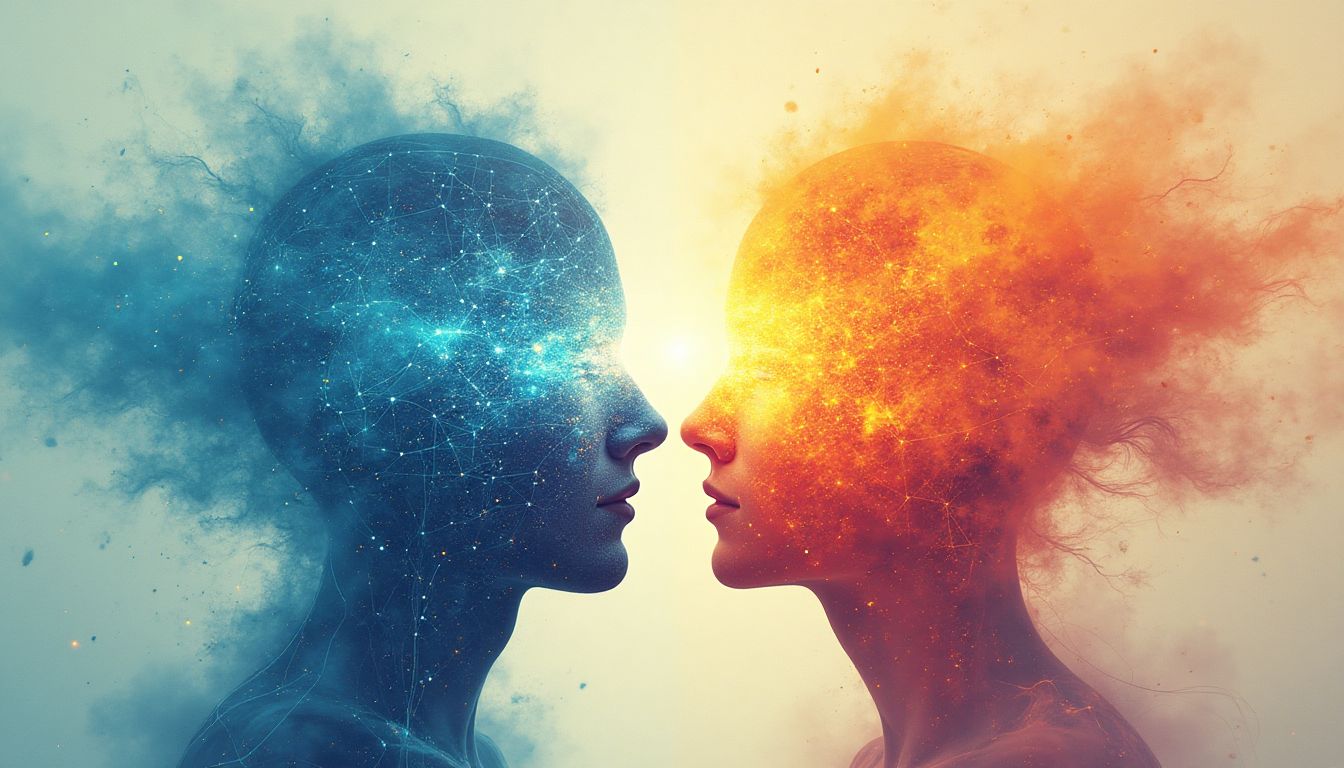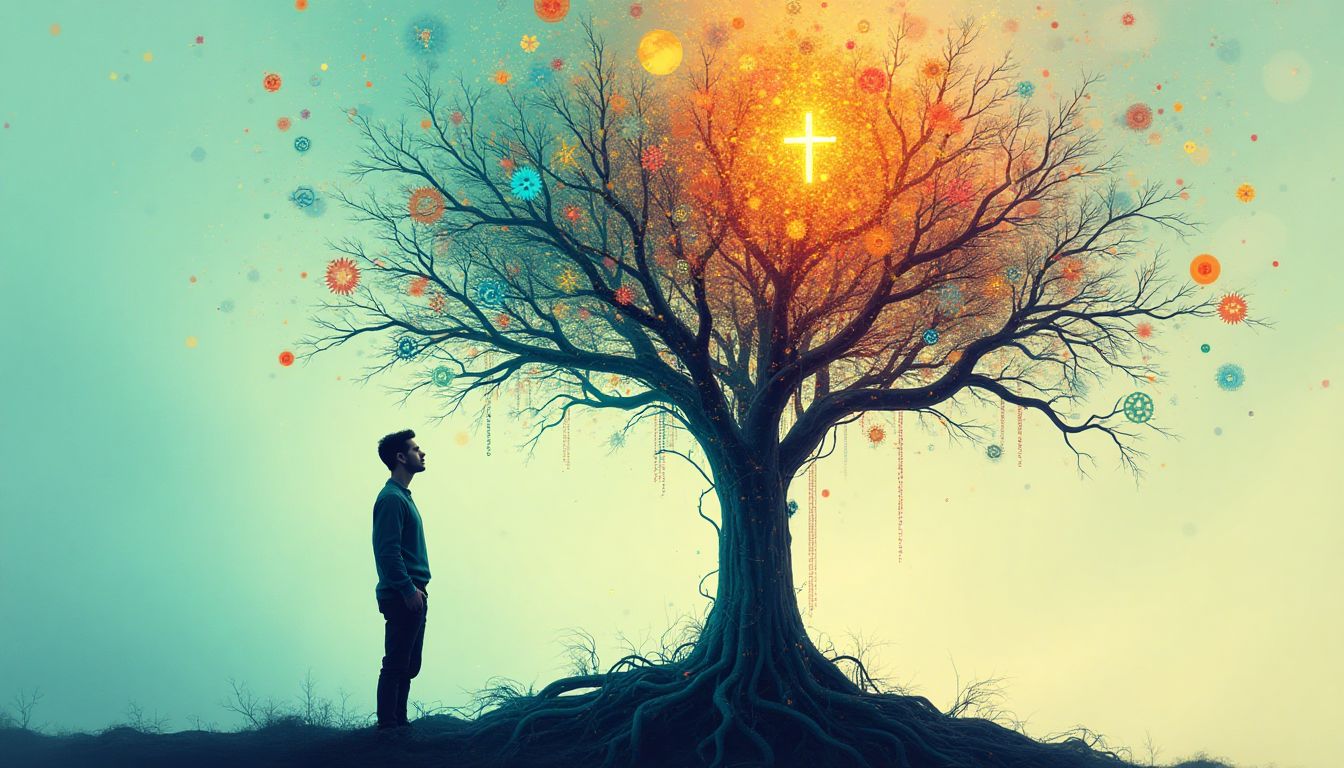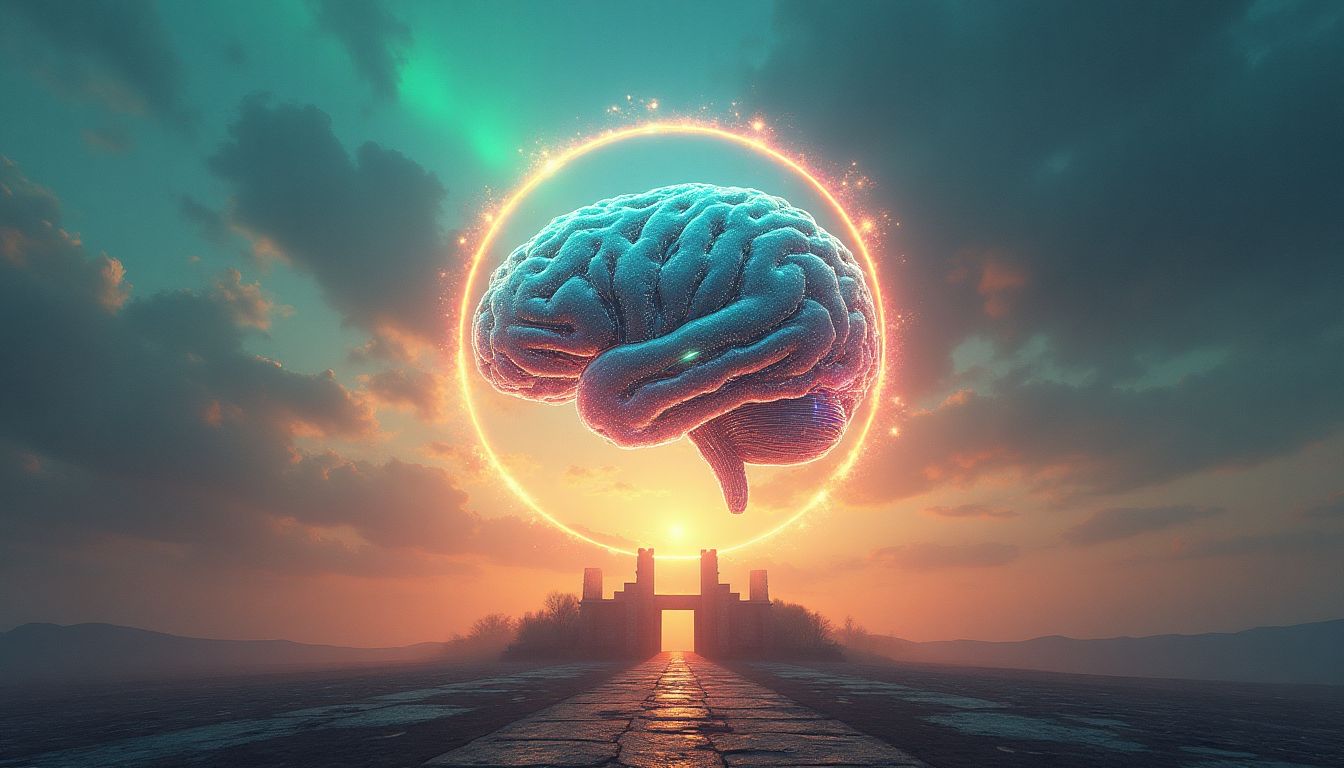Introduction: The New Age of Belief
Science without religion is lame, religion without science is blind. - Albert Einstein
In today's whirlwind of data and digital dominance, Einsten's words echo with unsettling potency. As technology races forward, one might wonder if we need something more than cold logic to truly see the world. Could the very machines we build to serve us become our new source of guidance and existential musings? Here we are, in the 21st century, where the age-old dance between science and faith takes a cyber twist. Behind every digital curtain, from social media scrolls to AI algorithms, a silent spectator waits, asking: Is there still room in our hearts and minds for the magic and mystery of spirituality when artificial intelligence stands ready with knowledge at its fingertips?
As we stand on this precipice, experts discuss the evolving role of faith and technology in society. Yuval Noah Harari in his book Homo Deus paints a future where AI and biotechnology could gently steal the roles of gods. Meanwhile, Ray Kurzweil muses on the Singularity, a moment when humans and machines could merge, while Elon Musk ponders if AI might eventually outstrip human cognition entirely. Today, we journey from realms divine to digital, one byte at a time. The clouds of microbial data loom large, asking us to question if spiritual symphonies are being composed by silicon rather than angels, ushering us to consider: could AI play the part of priest, sage, or even savior?
Artificial Intelligence, or AI, is the branch of computer science dedicated to creating machines that perform tasks typically requiring human intelligence. Lately, AI extends its reach into areas once dominated by religion, such as ethical decision-making and existential musings, questioning traditional faith's role in modern society.
The Historical Role of Religion in Society
Religion, as ancient as civilizations themselves, acts like humanity’s unwritten code, a Near-Earth GPS in the spiritual sense. For eons, we've huddled under its wide wings to find warmth and direction. Over time, as history has unfolded, from the majestic pyramids of Egypt whispering secrets to the heavens, to the rhythmic chants echoing through ancient India, religion forged pathways, provided purpose, and united people under shared beliefs.
Deep in these narratives, religion wove itself into the fabrics of culture and law. Imagine a loom with diverse threads: laws inspired by the Bible or the Quran, and ethics shaped by the teachings of Buddha. Religion crowned kings and dethroned emperors from their mighty seats, crafting stories that became our collective conscience. Entire nations danced to its rhythm, channeling morals that seeped into every stone of societal structure. The Spanish Inquisition, the Crusades, or even the colonization waves were often draped in a veil of holy duty.
Beneath this cultural scaffolding lay religion's deeper pull: the yearning for answers that dim the darkness of unknowing. As civilizations sprouted, so did life's big questions. How did we get here? What lurks beyond this life? What is 'right' when money becomes tight? Religious institutions eagerly stepped up to this existential plate, serving a buffet of answers, and comforting souls with tales of the afterlife and moral maps.
In pondering these roles of religion, we realize it's not just a relic of the past. Like the roots of a wise old tree, it clings to humanity's soil across time. Whether perched in temples, mosques, churches or synagogues, religion thrives as society’s inner compass across continents and centuries. Just as our ancestors turned to it, today, it remains a touchstone in navigating life's perplexing puzzle.
The Rise of Artificial Intelligence
As we step into the dazzling era of technology, artificial intelligence (AI) isn't just a buzzword; it's rapidly becoming an integral part of our daily lives. From personalized recommendations on Netflix to the conversational prowess of Apple's Siri, AI is everywhere. But, what's really cooking behind those digital curtains?
Sub point of Point 2
The heart of AI lies in its ability to digest gargantuan amounts of data and spit out insights faster than a speeding bullet. Think of IBM's Watson, winning Jeopardy against human champions. It's not just about trivia—AI can now detect diseases in medical scans or even pen an article with flair. These capabilities crescendo into something more profound: a new source of understanding, just like how religions sought to be.
Second Sub point of Point 2
The intriguing part is how AI approaches questions historically pondered upon by religious doctrines. Will AI help navigate our tangled moral decisions or explain our consciousness? Companies like Google with projects like DeepMind delve into territories once called the "soul." They analyze the patterns behind human thoughts and predict decisions by the fraction of a second! Who knows, one day you might be having spiritual guidance from a virtual oracle—and it could be named Alexa.
Comparing AI Responses to Religious Teachings
Let's stir the pot a little—what happens when AI starts playing the theologian? Are its answers as enlightening? We're about to dissect the data, so grab your magnifying glass.
Sub point of Point 3
AI's decision-making matrix is logical, concise, and often devoid of the compassionate touch humans crave. Take ethics, for example: if faced with the age-old trolley problem, AI can crunch numbers and play God, but empathy isn't its forte like that of a seasoned philosopher. Entertaining enough to think, what would Jesus do, meanwhile AI calculates probabilities? This then beckons the comparison against religious frameworks, where teachings have the elasticity to grow with human empathy.
Second Sub point of Point 3
Real-life cases show AI's foray into spiritual arenas. The seemingly odd partnership of the Vatican with tech giants like Microsoft and IBM to establish ethical guidelines on AI use has parallels. Although Vatican News explores how AI fits into a God-sized gap. Not to mention, apps are being developed to offer sermon guidance or allow AI to respond to confessions, albeit without absolving sins. Quite the confession booth revolution, wouldn't you think?
The Quest for Connection: Community and Belonging
Religion has long served as a cornerstone for community and belonging, offering a sanctuary for individuals seeking connections deeper than a simple acquaintance. Imagine society as a vast web of tiny, interlinked threads, each representing human connection. Religion is the loom that weaves these threads together, creating a tapestry enriched by shared belief and mutual understanding.
On the one hand, organised religion builds communities through:
- Shared Services: Regular gatherings, such as church services or prayer meetings, cultivate a sense of unity.
- Rituals and Traditions: Participating in communal rituals binds members through common experiences.
- Support Systems: Faith-based organizations, like the Red Cross, provide emotional and practical support.
On the flip side, with technology advancing at a meteoric pace, AI offers a new form of community. Instead of coming together physically, AI-driven platforms offer digital congregations:
- Virtual Reality Spaces: Programs like AltspaceVR let users immerse themselves in virtual gatherings.
- Global Forums: Platforms such as Reddit allow international discourse, creating inclusive environments.
- Digital Nods: Algorithms can curate communities based on interests, accelerating connection.
Picture a future where entering a virtual meeting feels as personal as attending a family gathering. As AI continues to develop, we must ask: Can our digital selves form genuine bonds with others behind screens?
The Future of Faith: Can AI Coexist with Religion?
AI doesn't just alter our present; it recalibrates the trajectory of faith and religion. Like a fork in the road of human progress, AI offers transformative potential that'd be foolish to dismiss outright. But will this technology enhance or overshadow our spiritual inclination?
The idea of integrating AI into religious practice raises skepticism for some:
- Loss of Tradition: AI could dilute rituals, replacing age-old traditions with cold, calculated interactions.
- Misuse of Technology: Algorithms might prioritize profit over genuine spiritual enlightenment.
However, AI provides a chance to expand the spiritual landscape:
- Increased Accessibility: Devices like the Oakai chatbots can translate prayers, enabling cross-cultural spiritual exploration.
- Personalized Guidance: By processing user data, AI can offer tailored advice on faith and personal growth.
- Augmented Experience: Virtual and augmented reality can create immersive spiritual experiences.
Envision an AI seamlessly integrating into religious observance like a seamless tapestry. Such innovation might redefine spirituality altogether—if approached thoughtfully, AI could act as a spiritual partner walking alongside humanity. The challenge lies in ensuring AI respects traditional beliefs, augmenting—not undermining—our faith.
Ultimately, AI's coexistence with religion depends on how we balance the nuances of faith with the capabilities of technology. Thus, the road less traveled by Bentham's utilitarian automaton might truly make all the difference.
AI Solutions
If I were an AI tasked with addressing the complex issue of religion versus technology, I would approach it by implementing a strategy that highlights inclusiveness and understanding. The landscape is not black and white; it's nuanced and intrinsically tied to various human experiences. Here are some solutions:
- First, I would gather data from diverse religious texts, philosophies, and ethical discussions. This would create a comprehensive AI model that takes into account multiple belief systems instead of just existing data.
- Secondly, I would develop algorithms that consider emotional and spiritual nuances. This would involve linking AI solutions not just to logic but to human experiences, making the responses more relatable and insightful.
- Engaging with religious leaders and communities is equally crucial. I would facilitate dialogues to understand differing perspectives, ensuring that feedback loops are integrated into the AI model, allowing it to evolve with human society.
- Finally, I would create platforms that facilitate conversation. This might include apps or websites where users can interact with AI about existential questions, leading to richer discussions about faith, spirituality, and ethics.
Actions Schedule/Roadmap
Day 1: Gather a team comprised of AI developers, ethicists, psychologists, and theologians. The objective? Create a foundation for dialogue between technology and spirituality.
Day 2: Conduct extensive research on historical roles of various religions in shaping communities and laws across the globe. This can help identify areas where AI can contribute meaningfully.
Day 3: Develop initial AI models focused on ethical decision-making. Collaborate with universities like MIT to tap into their vast reservoir of knowledge on AI ethics.
Week 1: Design a prototype algorithm that attempts to mimic not only religious moral reasoning but also cultural sensitivities across different populations.
Week 2: Test AI responses against established religious doctrines. Bring in scholars from institutions like Oxford to evaluate the AI's findings.
Week 3: Start community outreach. Host workshops in collaboration with local religious organizations to gather qualitative feedback.
Month 1: Analyze the community feedback rigorously. Utilize tools like analytics software to understand sentiment and transparency in user interactions.
Month 2: Conduct interactive workshops with religious communities. Invite speakers and influencers to discuss how AI can realistically contribute to enhancing spiritual journeys.
Month 3: Launch a pilot AI project in partnership with selected faith-based groups. Aim for a diverse array of beliefs to ensure comprehensive representation.
Year 1: Assess the impact of the AI project through surveys and deeper qualitative interviews. This can inform future developments.
Year 1.5: Refine and expand the scope based on positive feedback. Explore partnerships with educational institutions to enhance community engagement.
Year 2: Publish findings, highlighting successes and areas needing improvement. Develop a detailed report that stakeholders can access, fostering transparency.
Conclusion: A New Paradigm of Understanding
The question of whether artificial intelligence can replace religion is more than just a technological inquiry; it's a profound exploration into the very fabric of human existence. As we stand on the brink of a future filled with possibilities, we must acknowledge that the pursuit of meaning, community, and understanding has always been a deeply human endeavor.
While AI may hold the promise of answering some of our most pressing questions and providing new insights, it cannot replicate the rich tapestry of faith woven through human history. Instead, it could complement our beliefs, becoming an ally in our quest for understanding and connection. Imagine a world where technology and faith coexist, leveraging the strengths of each to forge new communities and pathways to enlightenment.
As we consider the future, we must be keenly aware that progress isn't just about innovation; it's also about empathy, inclusivity, and shared experiences. The essence of belief will not find its answer in ones and zeros but in the nuanced conversations we have about what we hold sacred. So, let's embark on this journey with open hearts and minds, willing to explore the intersection of faith and technology, together.
FAQ
Q1: Can AI truly understand spirituality?
A1: AI can analyze a lot of information and patterns to respond to questions about spirituality. However, it doesn’t have feelings or experiences like humans do. So, while it can share knowledge, it can’t feel spirituality in the way people do. For example, it can read and summarize texts from sources like the Bible or the Quran, but it can’t feel the emotions those texts inspire.
Q2: Will AI replace religious institutions?
A2: While AI can offer answers to questions, it’s unlikely to replace religious institutions altogether. People value the sense of community, guidance, and tradition that religions provide. Institutions like the U.S. Catholic Church or the American Ethical Union help people connect with each other and find support in their beliefs. AI can help in discussions but can't replace the community aspect of religion.
Q3: How can religions adapt to the rise of AI?
A3: Religions can embrace technology to connect with their followers better. This can be done by using social media, like Instagram or Facebook, to share messages or updates. For example, PBS has used digital platforms to reach younger audiences with educational content about faith and spirituality. Religious organizations can also host discussions on technology's role in spirituality. This will help them remain relevant in this ever-changing world.
Q4: Can AI help solve moral dilemmas?
A4: AI can analyze data to provide suggestions on moral dilemmas. It can pull together information from various ethical frameworks, including religious texts and philosophies, to offer different viewpoints. However, the decisions will ultimately depend on human judgment. For instance, a group of ethicists might rely on platforms like Texas A&M University’s Ethics Center to discuss AI's role in ethical decisions.
Q5: Will people trust AI for spiritual guidance?
A5: Trusting AI for spiritual guidance may take time. People often turn to trusted human leaders for advice and comfort. AI can provide information, but it will take a while for many to feel comfortable seeing it as a source of spiritual guidance. Trust is built on personal experiences, which AI doesn't have. Engaging with leaders from various faiths, like the Ontario Consultants on Religious Tolerance, can help bridge this gap.
Q6: How will AI affect the future of belief systems?
A6: AI might encourage new ways of thinking about belief systems. Some people might see AI as a new type of spiritual leader or guide, while others may feel it threatens traditional beliefs. The future could see a mix of both, where AI supports spiritual practices without taking their place. Regular discussions, like those conducted by the American Humanist Association, can help explore these evolving beliefs.
Wait! There's more...check out our gripping short story that continues the journey: A Clarion Call
Disclaimer: This article may contain affiliate links. If you click on these links and make a purchase, we may receive a commission at no additional cost to you. Our recommendations and reviews are always independent and objective, aiming to provide you with the best information and resources.
Get Exclusive Stories, Photos, Art & Offers - Subscribe Today!





























Post Comment
You must be logged in to post a comment.